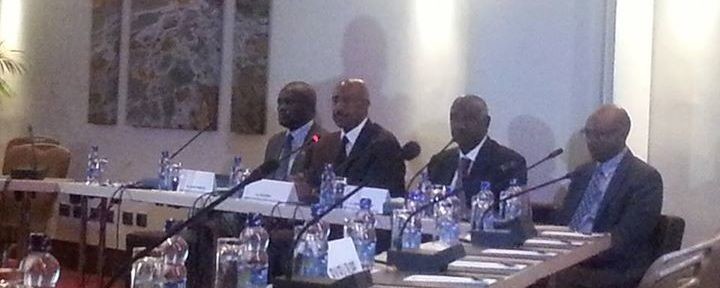Peace talks between South Sudan’s warring parties were delayed when the opposition boycotted the opening of a new round of talks in the Ethiopian capital Addis Ababa, after objecting to the process by which civil society representatives had been chosen for the talks.
IGAD, the East African regional body mediating the talks, announced on its Facebook page on Monday, “the launch of the Multi-stakeholders Roundtable Negotiations originally scheduled for this morning has been deferred to a later date.”
This comes after Hussein Mar Nyuot, SPLM/A-in-Opposition spokesman, said that the process of nominating civil society representatives to the talks has not been transparent and inclusive.
In a deal signed on 9 May 2014, both parties agreed that they would permit the inclusion of civil society representatives at the peace talks, though later they expressed reservations about how the civil society participants should be selected.
The government and opposition also agreed to allow participation by other political parties and by a breakaway faction of the ruling party, the so-called ‘third bloc’ of the SPLM led by Pagan Amum.
In spite of the May agreement, the government blocked the travel of some politicians to a symposium in Addis Ababa earlier this month, and disputes broke out among civil society groups over which ones should be accredited to the next round of talks.
Hussein Mar, the rebel spokesman and a former deputy governor of Jonglei, said the civil society were selected by IGAD in a ‘faulty process.’ The rebels also suggested that civil society groups be brought in from rebel-held territories of South Sudan.
“The SPLM/SPLA[in-Opposition] seriously objects to this faulty process and calls for a credible, transparent, and inclusive process to be conducted for selecting other stakeholders’ delegates,” the armed opposition said in a statement.
On Sunday they further threatened to boycott the opening of the ceremony of the IGAD peace talks scheduled for Monday if their demand for “fair and just inclusion of all stakeholders to peace is not met” – a threat they apparently carried out.
Ambassador Seyoum Mesfin, the IGAD chief mediator, confirmed the opposition’s boycott, saying they had complained about the way the selection of civil society participants was carried out.
“The SPLM/A in Opposition delegation has written complaints on the representation of other political parties and civil society organizations and for that reason they have absented themselves not to join us for the launch,” he said.
For its part, the Foreign Ministry of South Sudan said the exact reason for the postponement was not yet clear, while nonetheless confirming the rebels’ objections on the matter of civil society participation.
As quoted by Eye Radio FM, the spokesman of the ministry, Ambassador Mawien Makol, said, “They [the mediation] are saying that there was a concern about the other side [the rebels] regarding to the way the civil society has been formed.”
‘Elements on both sides are trying to derail the process’
In an interview, Luka Biong Deng, a former cabinet minister, told RFI news agency he thought that some individuals on both the government and rebel side saw the peace process as threatening to their own positions and wanted to derail it.
Luka noted that the IGAD mediation had shown “a very serious commitment” by threatening punitive sanctions against the South Sudanese warring parties.
This was seen negatively in some quarters, he said: “Possibly this idea of IGAD becoming very assertive might have triggered some elements who are seeing themselves to be losers to derail the process.”
He clarified that the ‘elements’ he was referring to were people within both the government and rebel teams. Without naming anyone, he explained that some rebel and government officials were opposing the talks because they would lose out in a political settlement between the two sides.
Among those who have recently voiced criticism of the peace process or the mediators themselves are Vice President James Wani Igga and Minister of Information Michael Makuei.
Igga was quoted as saying that the government should not accept any power-sharing arrangement in which the rebels joined the cabinet. In a speech in Kampala on Saturday he said that it would be ‘unwise’ for the government to share power with rebels, arguing that it could spur more rebellions in the country.
Makuei, for his part, told AFP news agency that he objected to comments made last week by IGAD executive secretary Mahboub Maalim that the South Sudanese president was ‘stupid’ for believing military victory was possible in the conflict.
Nonetheless, the IGAD mediation team apparently still intends to launch the next round of negotiations, though it did not yet clarify how it would address either the rebels’ or government’s concerns.
“The launch will be a milestone event for the Mediation Process as the SPLM Leaders (Former Detainees), other political parties, civil society and faith leaders will sit at the negotiation table for the first time,” the IGAD team announced.
Photo: IGAD Special Envoys announce the postponement of the talks



